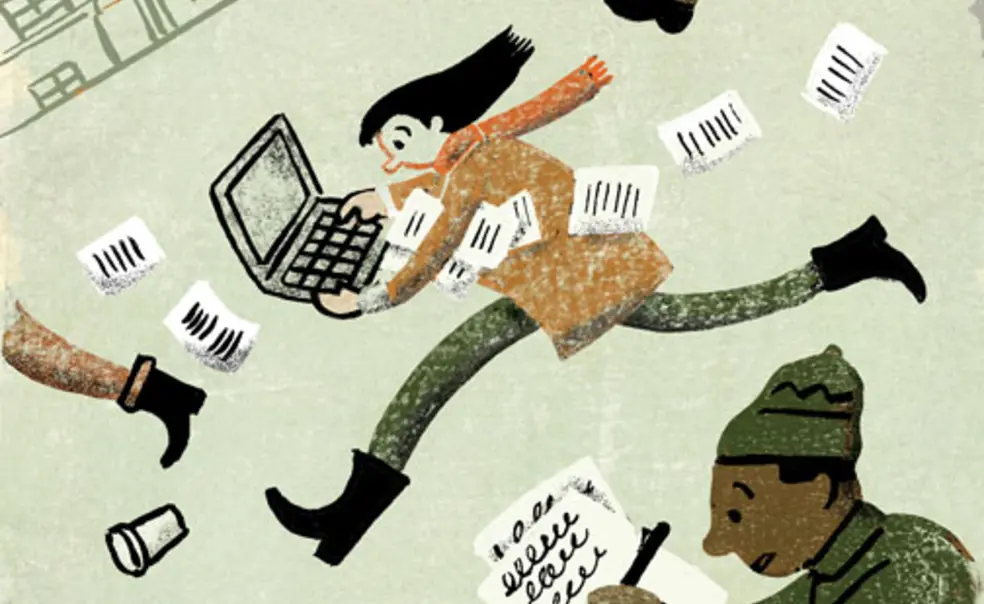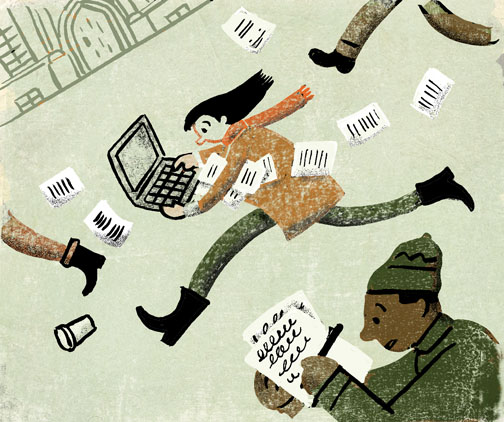Running out of time; singing calendar blues
“Those are the lazy people,” said Sean Chen ’13, gesturing to two students who had decided to lean out of their third-story dorm-room window rather than join the crowd in the snowy courtyard. He, like the pair, was waiting for the Holder Howl, a loud, impromptu event that occurs the night before every Dean’s Date, when all written work is due.
This winter, Dean’s Date Eve was Jan. 10, and crowds of students began trick ling into the courtyard at 11:55. At midnight, the courtyard burst into noise — shrieking, screaming, cathartic noise. It was officially Tuesday, Dean’s Date. Chen pulled out a camera, and he and his friend Evan Larson ’13 started filming.
“Never again will I procrastinate like this!” Chen yelled into the camera. “That’s a lie!” he added. Then he yelled some more, until the crowd of students racing to finish papers mostly had dispersed, leaving only the sound of a halfheartedly tooted vuvuzela.
Then the two sophomores trudged back to work, each fired up to finish a Dean’s Date workload of 40 pages.
On Dean’s Date Eve, aside from the minute-long Holder Howl, the only people you’ll see out around campus are those who don’t have any papers left to write. Everyone else is parked in front of a laptop, a pile of books, and a caffeinated beverage. Occasionally the busy emerge, usually for free food and coffee.
“There’s a certain mutual feeling of dread that brings us closer together,” said Alex Chuka ’14, who was tackling his first Dean’s Date. He interrupted work on his 15-page freshman-seminar paper on security and democracy for a coffee-fueled study break in the Witherspoon Hall basement.
At Frist, two juniors sat at a table offering prayers for passing students. The “prayer booth” was offered all semester, but Dean’s Date was a popular night.
“The vast majority of people are asking for prayer for the papers due tomorrow,” said Trent Fuenmayor ’12, who was manning the table with Dave Kurz ’12.
One student who stopped at the table still had 30 pages to write before the 5 p.m. deadline. “She was like, ‘The only way this is getting done is if God helps me,’” Fuenmayor said.
By Isabel Pike ’11
While Princeton students were back on campus in early January, churning out essays and studying for exams, most college students were carefree at home.
When Harvard changed its academic calendar last year, Princeton became the only Ivy League school to schedule fall-semester exams after winter break — a blessing for some students, a major annoyance for others.
Lisa Einstein ’13, a prospective physics major, said taking exams after the break “gives us time to really solidify the lessons we’ve learned. I like having time for the concepts to marinate.”
But other students said it’s challenging to retain first-semester course content over the break, and the schedule makes the holiday period less enjoyable.
Nushelle de Silva ’11, an architecture major from Sri Lanka, said the calendar complicates her trip home, which involves a 20-hour flight and a 10-hour time difference. “My short break home is stressful. I have to balance family obligations for Christmas with prepping for finals,” she said.
A 2009 survey by the Undergraduate Student Government found that while 71 percent of students would prefer exams before winter break, it wasn’t clear what they were willing to give up.
“Students want finals before break but aren’t ready for the sacrifices of starting earlier or having shorter reading periods and fall breaks,” said Michael Weinberg ’11, chairman of the USG’s undergraduate life committee.
This fall might be an “interesting time” to readdress the issue, Weinberg said, because “a few years have passed since the USG took a stab at it, and we’ll have a new dean of the college.”
So why is Princeton the odd school out, calendar-wise? “Everyone used to have that schedule. We’re the only school that hasn’t switched,” said Dean of the College Nancy Weiss Malkiel, who headed the Committee on the Course of Study that studied the academic calendar from 2005 to 2007.
The committee reached no clear conclusion. “There was no consensus at all among undergraduates that they would prefer exams before Christmas,” she said.
Malkiel does not see change in the near future: “If the faculty were to vote on a new calendar, which is unlikely to happen any time soon, it would be four years before the new calendar could take effect.”













No responses yet